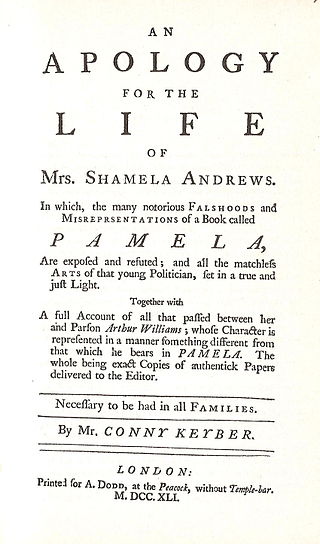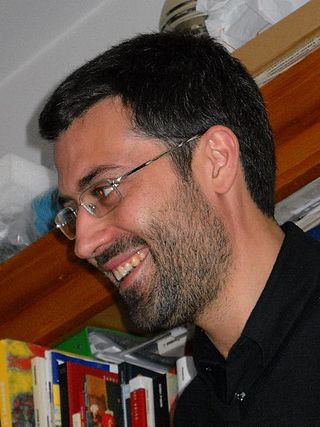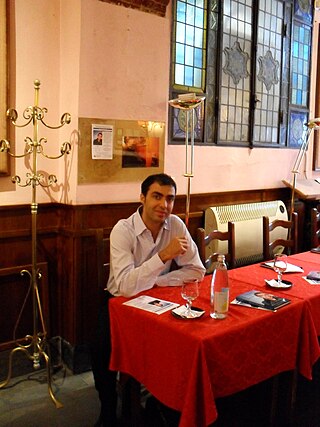Related Research Articles
Genre is any style or form of communication in any mode with socially agreed-upon conventions developed over time. In popular usage, it normally describes a category of literature, music, or other forms of art or entertainment, based on some set of stylistic criteria. Often, works fit into multiple genres by way of borrowing and recombining these conventions. Stand-alone texts, works, or pieces of communication may have individual styles, but genres are amalgams of these texts based on agreed-upon or socially inferred conventions. Some genres may have rigid, strictly adhered-to guidelines, while others may show great flexibility. The proper use of a specific genre is important for important for a successful transfer of information (media-adequacy).
Hypallage is a figure of speech in which the syntactic relationship between two terms is interchanged, or – more frequently – a modifier is syntactically linked to an item other than the one that it modifies semantically. The latter type of hypallage, typically resulting in the implied personification of an inanimate or abstract noun, is also called a transferred epithet.

Carlo Levi was an Italian painter, writer, activist, independent leftist politician, and doctor.

Gérard Genette was a French literary theorist, associated in particular with the structuralist movement and with figures such as Roland Barthes and Claude Lévi-Strauss, from whom he adapted the concept of bricolage.

Luigi Tenco was a popular Italian singer-songwriter.

An Apology for the Life of Mrs. Shamela Andrews, or simply Shamela, as it is more commonly known, is a satirical burlesque novella by English writer Henry Fielding. It was first published in April 1741 under the name of Mr. Conny Keyber. Fielding never admitted to writing the work, but it is widely considered to be his. It is a direct attack on the then-popular novel Pamela (1740) by Fielding's contemporary and rival Samuel Richardson and is composed, like Pamela, in epistolary form.
In literary interpretation, paratext is material that surrounds a published main text supplied by the authors, editors, printers, and publishers. These added elements form a frame for the main text, and can change the reception of a text or its interpretation by the public. Paratext is most often associated with books, as they typically include a cover, title, front matter, back matter footnotes, and many other materials not crafted by the author. Other editorial decisions can also fall into the category of paratext, such as the formatting or typography. Because of their close association with the text, it may seem that authors should be given the final say about paratextual materials, but often that is not the case.
"Che gelida manina" is a tenor aria from the first act of Giacomo Puccini's opera, La bohème. The aria is sung by Rodolfo to Mimì when they first meet. In the aria he tells her of his life as a poet, and ends by asking her to tell him more about her life. It is one of the most recorded arias by tenors.

Zigu Ornea was a Romanian cultural historian, literary critic, biographer and book publisher. The author of several monographs focusing on the evolution of Romanian culture in general and Romanian literature in particular, he chronicled the debates and meeting points between conservatism, nationalism, and socialism. His main early works are primarily dedicated to the 19th and early 20th century cultural and political currents heralded by Junimea, by the left-wing ideologues of Poporanism and by the Sămănătorul circle, followed independently or in relation to one another. Written as expansions of this study were Ornea's biographical essays on some of the period's leading theorists: Titu Maiorescu, Constantin Dobrogeanu-Gherea and Constantin Stere.

Igiaba Scego is an Italian writer, journalist, and activist.
A parody is a creative work designed to imitate, comment on, and/or mock its subject by means of satirical or ironic imitation. Often its subject is an original work or some aspect of it, but a parody can also be about a real-life person, event, or movement. Literary scholar Professor Simon Dentith defines parody as "any cultural practice which provides a relatively polemical allusive imitation of another cultural production or practice". The literary theorist Linda Hutcheon said "parody ... is imitation, not always at the expense of the parodied text." Parody may be found in art or culture, including literature, music, theater, television and film, animation, and gaming.

Andrea Bajani is an Italian novelist, poet, and journalist. After his debut with Cordiali saluti, it was Se consideri le colpe which brought him a great deal of attention. Antonio Tabucchi wrote about his debut novel, "I read this book with an excitement that Italian literature hasn't made me feel in ages." The book won the Super Mondello Prize, the Brancati Prize, the Recanati Prize and the Lo Straniero Prize.

Paolo Bonolis is an Italian television host. He made his debut in 1981 on 3, 2, 1... contatto!, a programme for children that aired on Italian national broadcaster Rai.

Cheikh Tidiane Gaye Senegalese-Italian writer, essayist, poet and peace activist.
Transtextuality is defined as the "textual transcendence of the text". According to Gérard Genette transtextuality is "all that sets the text in relationship, whether obvious or concealed, with other texts" and it "covers all aspects of a particular text". Genette described transtextuality as a "more inclusive term" than intertextuality.

Laura Ravetto is an Italian politician.

Menotti Augusto Serse Lerro is an Italian poet, writer, playwright, librettist and Anglicist academic. His work explores matters of social alienation and existentialism, the physicality and vulnerability of the body, the interpretation of memories, the meaning of objects and the philosophical importance of human identity. In 2015 he published Donna Giovanna, l'ingannatrice di Salerno, a feminized bisexual version of the mythical figure of Don Juan, El Burlador de Sevilla. In 2018 he wrote Il Dottor Faust, an original version of the character of Faust. In addition he is the author of a New Manifesto of Arts and the founder of the Empathic Movement (Empathism) that arose in the South of Italy at the beginning of 2020.

Carlo Nordio is an Italian politician, former magistrate and prosecutor, who is serving as Italian Minister of Justice since 22 October 2022, in Giorgia Meloni's government. In the 2022 Italian presidential election he was the candidate of Brothers of Italy for President of Italy. In the 2022 Italian general election he was elected to the Chamber of Deputies.
Marianna Pia "Maria" Villani Scicolone is an Italian television personality, columnist and singer.

The 2023 Democratic Party leadership election was a primary election that was held in Italy in February 2023 to elect the National Assembly and secretary of the Italian Democratic Party (PD). It consisted of a closed primary election among party members held from 9 to 19 February, and an open primary election held on 26 February.
References
- Elices Agudo, Juan Francisco (2004) Historical and theoretical approaches to English satire
- Vasarri, Fabio (2006) Premessa ("Preface") to La parodia by Daniel Sangsue (2006).